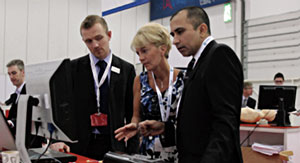The British Cardiovascular Society (BCS) has always had a significant role in education for cardiologists, largely through the BCS Annual Conference. The recognition of broader educational needs for trainees as well as trained cardiologists has led to a strategic change in educational activities within the BCS with a more comprehensive and structured approach to its delivery. In this column Dr Iain A Simpson, Vice President of Education and Research at the BCS, discusses educational activities within the BCS.
Responsibility for training of cardiologists in the UK does not lie with the BCS or its affiliated groups but rather with the General Medical Council, delivered through the Joint Royal College of Physicians Training Board, the Specialist Advisory Committee in Cardiology and through the individual postgraduate deaneries across the UK. The template for training in cardiology is the 2010 Cardiology Curriculum (available from: www.jrcptb.org.uk/specialties/ST3-SpR/Pages/Cardiology.aspx), which not only details the areas to be covered but also the assessment methods against which successful training is judged.

Although the BCS does not have a mandate for training, with its Affiliated Groups it has a membership uniquely positioned to coordinate, develop and deliver high-quality education to facilitate training requirements. In addition, through national training days and webcasting of key educational programmes it can ensure delivery of education is more uniform and accessible to all. There are already many excellent educational programmes being delivered on a regional basis and through the Affiliated Groups, so one of the aspirations of the BCS is to provide a detailed ‘map’ of educational activities, which are linked to the Cardiology Curriculum, on a regional and national basis. In addition to providing a resource of activities, the BCS has also agreed a number of quality indicators that will allow BCS Educational Endorsement of programmes, which trainees can use to ensure they are appropriate for the needs of their curriculum-based training. To achieve BCS Educational Endorsement, programmes should fulfil the following:
- Be non-promotional educational programmes
- Have an educational content that is evidence based and, where possible, includes reference sources
- Include specific learning objectives
- Incorporate formative assessment of learning objectives
- Include feedback on educational course content, which is used to improve any subsequent programmes.
This does not mean that other educational programmes are not of good quality but rather that BCS endorsed programmes are specifically targeted at, and fulfil the needs of, cardiology training.
The template
The Cardiology Curriculum is the template for trainee education, but, as it covers the spectrum of clinical cardiology, it can also be used to structure educational programmes for trained cardiologists, and emphasises the need to look at education from the following perspectives:
- Knowledge
- Skills
- Professionalism
Knowledge-based education lends itself well to be delivered by lectures, workshops, webcasting, etc. and, for trainees, this supplements the information available from the curriculum-based European Textbook of Cardiology. For the BCS this is also delivered through our Annual Conference and through links with Education in Heart. For trainees the development of two national training days has been supplemented by the highly successful Cardiology Review Course held each spring in conjunction with the Mayo Clinic. Using this as a template, a further Cardiology Review Course for trained cardiologists is planned to launch in the autumn of 2011.
Skills-based training is especially important in cardiology where procedural activities form so much of our clinical practice, yet skills training outside of the traditional ‘on-the-job’ experience is rare but gaining considerable interest as simulators for interventional cardiology, electrophysiology and trans-oesophageal echocardiography become increasingly sophisticated. For several years simulator training has occurred at the BCS Annual Conference, yet there are other aspects of skills training, such as basic surgical skills of suturing and handling of surgical instruments, that the BCS is supporting in conjunction with the Royal College of Surgeons and Heart Rhythm UK.
Professionalism is an area of education that is not specific to cardiology but spans the breadth of medicine. In the UK, Good Medical Practice Guidelines published by the General Medical Council (available from: www.gmc-uk.org/guidance/good_medical_practice.asp) are the template for professional standards. The areas of consent, communication, probity, clinical and fiscal management, medico-legal training, as well as commissioning of services, are something we have tried to embed within the BCS Annual Conference.
Summary
So the educational activities of the BCS are many and diverse. They continue to grow but in a structured manner, in full cooperation with the Affiliated Groups, with an aspiration to further improve the quality of education for trainees and trained cardiologists, and to hopefully facilitate the needs of impending revalidation, but ultimately for the benefit of our patients.
